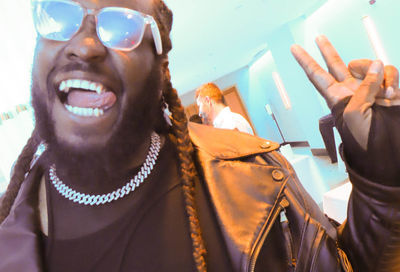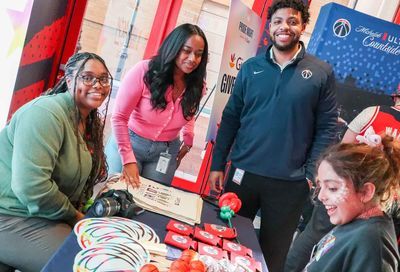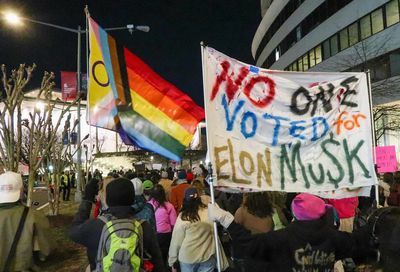4 reasons why LGBTQ people should be concerned about the Supreme Court abortion case
The Task Force's Kierra Johnson breaks down why the Mississippi abortion case has serious implications for the entire LGBTQ community.

On Wednesday, the U.S. Supreme Court heard oral arguments in Dobbs v. Jackson Women’s Health Organization, a case challenging a Mississippi law that bans most abortions after 15 weeks of pregnancy.
The law, which only allows abortions in medical emergencies or cases of severe fetal abnormality, has been blocked from taking effect by both a federal district judge and even by the conservative-leaning 5th U.S. Circuit Court of Appeals.
Supporters of the ban argue it’s intended to regulate “inhumane procedures” and contend that a fetus is capable of detecting and responding to pain by 15 weeks.
By taking up the case, the Supreme Court has decided to determine whether “all pre-viability prohibitions on elective abortion are unconstitutional.”
But when Mississippi filed its opening brief, it went further arguing that the nation’s highest court should overturn in their entirety Roe v. Wade and Planned Parenthood v. Casey, a pair of decades-old Supreme Court decisions that have been credited with establishing a right to abortion, albeit with some restrictions or regulations, depending on where a person resides.
The crux of the case relies on whether the nation’s highest court will rely on precedent — as the court’s three liberal justices want — and reaffirm the right to an abortion, or overturn Roe and Casey, thereby allowing individual states to make their own laws about whether to outlaw or restrict abortion access.
While access to abortion has historically been viewed as a “women’s rights” issue, such a moniker is a misnomer, as transgender men are able to become pregnant, and thus, may have the need to access abortion.
Additionally, cisgender lesbians can become pregnant and may also require reproductive health services.
But the issue of reproductive rights goes beyond the process of abortion itself, touching on much larger human rights issues such as bodily autonomy and the right to self-determination, according to Kierra Johnson, executive director of the National LGBTQ Task Force.
According to Johnson, there are several reasons why LGBTQ people should not only be aware of, but actively engaged in the fight for reproductive health services.
1. A lack of reproductive health services disproportionately impacts marginalized communities.
“Sexual liberation is a part of our movement, is a part of our LGBT community,” says Johnson. “It is something that we celebrate. And that is exactly what the war is about. If you are operating outside of what is ‘appropriate’ as a ‘good woman,’ as a heterosexual man, as a monogamous, married couple, then you deserve whatever you get. And it is often posed in this negative, pejorative, burdened way. If you get sick, too bad for you. If you get pregnant, too bad for you. If you can’t keep a job long enough to help your ends meet, too bad for you.
“My sister got pregnant at 16 years old. And I was convinced she should have an abortion. And she was like, ‘I’m having a baby.’ And I was like, ‘What?’ She supposedly made the ‘right’ decision, and the reality was that she had no support to help her carry a pregnancy to term and also finish high school. She ended up having to drop out and ended up getting her GED later. She was struggling to get child care so that she could hold down a job.
“When I think of the ridicule and judgment she received, as a young black body pushing a baby down the street, the things people would say and the looks that she got, I just knew the fight was bigger than access to abortion or not. It was about who is deserving of the decision-making power to determine what’s best for their for their lives and to get the support to carry that through.
Related: The fight for reproductive rights is more intertwined with the LGBT movement than many realize
“I think sometimes people get stuck on abortion, and while that is one part of the puzzle, all we have to do is pull the camera lens back just a little bit to see it’s not just about abortion, it’s about who gets to control our bodies. It is clear that whoever controls the bodies has the power. It’s about agency, it’s about self-determination. It’s about sexual freedom, liberation, and economic stability. And when you take agency away, when you take bodily autonomy away, you control so much of a person’s experience, their ability to own their own personal and community power…. It isn’t about abortion, it is about controlling bodies based on someone else determining your worthiness.”
2. Opponents of abortion rights are often also opponents of LGBTQ progress.
“I think it’s easy to see yourself outside of the fight, if it’s narrowly defined as an abortion rights issue,” says Johnson. “I think it is really difficult to not see yourself in it when it is about agency right and self-determination.
“A lot of the same proponents who’d like to see abortion outlawed altogether want to criminalize people who talk about birth control in schools. The same people are trying to annihilate sex-ed that can be lifesaving and identity-affirming for young people.
“There’s a whole segment of people again who are against abortion who also are against birth control as well. Often these folks are the same people who also deny, and want to continue to deny, queer couples from being foster parents or adoptive parents.
“So this isn’t just about controlling who has an abortion or who doesn’t have an abortion, it is control of who gets to have a family, who gets to decide when they’re going to be parents, who gets to decide how many children, who gets to decide who they want to build a family with, like who gets the agency and decision-making power to do that.”
3. Restricting reproductive access potentially opens the door to further discrimination against others.
“A lot of the narratives you hear around pregnancy are that it’s something you should have to endure because of the choices that you made,” notes Johnson. “That is not much different than the argument, ‘You shouldn’t have access to lifesaving care if you have HIV or AIDS, as a consequence of the decisions that you made.'”
On Wednesday, during oral arguments, Supreme Court Justice Amy Coney Barrett asked Mississippi Solicitor General Scott Stewart whether a ruling in favor of upholding the 15-week ban would endanger other constitutional rulings on issues like the right to use birth control and the right to same-sex marriage. Stewart replied that it would not because abortion is a different issue.
But Johnson says Barrett’s premise is flawed, as overturning Roe as a “states’ rights” issue will invariably lead to challenges of other nationwide decisions that conservatives don’t like, such as the legalization of same-sex marriage in the Obergefell v. Hodges case, or the Bostock v. Clayton County case finding anti-LGBTQ discrimination in employment illegal under the Civil Rights Act.
“The Mississippi case is specifically about abortion. But I think the issue, in a larger context, is about how legislation and religious refusals can be weaponized to discriminate and to deny us civil and human rights,” Johnson says, pointing to a slew of anti-LGBTQ legislation in states that seeks to undermine those decisions.
“We’re already seeing religion being weaponized to deny trans kids the right to play sports or make it legal to discriminate against queer people seeking medical care, or jobs, or housing, and so on, down the line.
“And depending on how this case goes, we could see further restrictions on abortion, or religious refusals that have really devastating effects for queer people in our quest for a full, realized liberation, freedom, or humanity. There’s no reason to believe that they wouldn’t go there. We’ve already seen it.”
4. Movements aren’t successful if they sacrifice some of their members or their allies for political expediency.
“I don’t have to experience discrimination to know discrimination is wrong,” says Johnson. “I do not have a disability. But when I see discrimination or ableism, just because I don’t personally experience it doesn’t mean I can’t see it’s wrong. It doesn’t have to be about me, although I do believe that how we come together around the different fights for civil or human rights impacts us all.
“Are we only willing to fight if it affects us in a singular way? What kind of movement are we building when we know the women and trans folk in our movement are under attack, and we’re not willing to do anything, and we sacrifice them? That can’t be the movement we’re trying to build. We can’t leave our people behind.”
“Opponents of abortion will try to make you believe [the fight over abortion] is not about you. Meanwhile, it has everything to do with you because it’s about your family. It’s about your community. It is ultimately about the foundational values that our movement is built on.”
Read Next:
Biden recognizes World AIDS Day, highlights impact of HIV on LGBTQ community
Pitchers awarded $100,000 grant from NGLCC and Grubhub
Gay couple beaten with hammer and robbed by gang after holding hands
Support Metro Weekly’s Journalism
These are challenging times for news organizations. And yet it’s crucial we stay active and provide vital resources and information to both our local readers and the world. So won’t you please take a moment and consider supporting Metro Weekly with a membership? For as little as $5 a month, you can help ensure Metro Weekly magazine and MetroWeekly.com remain free, viable resources as we provide the best, most diverse, culturally-resonant LGBTQ coverage in both the D.C. region and around the world. Memberships come with exclusive perks and discounts, your own personal digital delivery of each week’s magazine (and an archive), access to our Member's Lounge when it launches this fall, and exclusive members-only items like Metro Weekly Membership Mugs and Tote Bags! Check out all our membership levels here and please join us today!






















You must be logged in to post a comment.